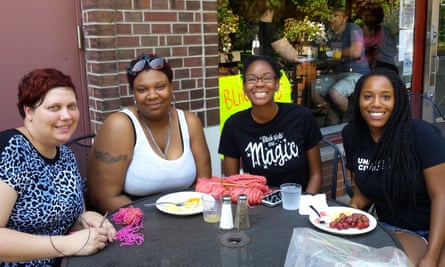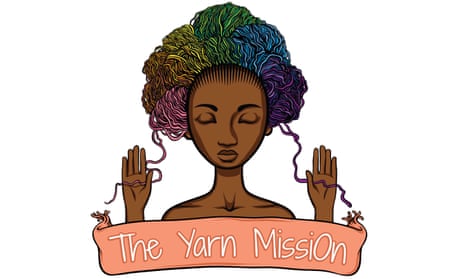In a coffeehouse on the south side of St Louis, a group of women discuss how to knit, purl and dismantle white supremacy.
They are The Yarn Mission, a collective formed in October 2014 in response to the violence and police brutality in nearby Ferguson, Missouri.
The Yarn Mission seeks to “use yarn to promote action and change to eradicate racism, sexism, and other systems of oppression”. The group, founded by CheyOnna Sewell, a PhD student in criminology, seeks to spark conversation about race and police brutality by engaging with curious passersby as they knit, all while providing a comforting activity for beleaguered activists.
“As a black woman, you’re invisible,” says Taylor Payne, a member of the group. “But knitting makes people stop and have a conversation with you. If someone asks me what I’m doing, I say, ‘I’m knitting for black liberation.’ Sometimes they respond and sometimes I just get ‘Oh, my grandma knits,’ like the person didn’t hear me. But at least it opens the door to talking about my experiences.”
Sewell and Payne are protesters who have been active in the Ferguson movement since it began last summer. According to Sewell, the Yarn Mission forces local citizens to see Ferguson activists in different ways.

“People who would never otherwise talk to you will engage with you about what you’re doing,” she says. “They come to see that the people who are out in the street are very nice, and that we are openly talking about race and racism. The group provides a path into the movement that people aren’t even looking for.”
Though anyone can join the Yarn Mission, the group consists mainly of black St Louis women who meet every other Sunday to knit and chat in parks and coffee shops. The number of knitters present at each session has ranged from a few to more than 20, with women of all ages participating. One of the group’s goals is to encourage community engagement by knitting in public spaces, with the members’ colorful handmade items serving as the impetus to a surprising conversation.
“People consistently underestimate the power of knitting,” says Sewell. “They don’t recognize its radical properties. They’re always surprised when they talk to us about what why we’re knitting, like, ‘Is she talking about racism right now? Did she really just say ‘police brutality?’”
Inside MoKaBe’s, a coffeehouse where the group frequently meets – and where protesters were famously teargassed last November as Ferguson burned – a display of cowls and scarves stands on a back room table. One is labeled a “unity cowl” with a tag declaring: “Look at the cowl’s pattern and you will see the properties of unity. Even when we seem loose and spread out, we are connected.”
According to Sewell, the Yarn Mission not only furthers discussion of racism and sexism, but serves an under-represented group: black knitters.
“When you see images of women knitting on TV, they’re predominantly white,” she says. “When you go into a local yarn store, everyone is white. The concept of having time for leisure is predominantly white. As a black person you might not want to join an all-white knitting group, you might feel like it’s safer to censor yourself in those circumstances. But I always feel that anyone who wants to come here can. If you want to be the Yarn Mission, then you are the Yarn Mission.”
On a warm August day, the group knitting at MoKaBe’s comprised three black women and one white woman. Over brunch they discussed the weather, but soon the conversation turned to Sandra Bland, the black woman who died in a Texas jail.
“That could have been me,” said one woman. “Some people are threatened by us existing,” said another, casting on a loop of pink yarn. “You’re just supposed to say ‘Yes’m, master.”
The women who participate in the Yarn Mission view it as a form of activism, but it is one that helps relieve stress. They cannot escape structural racism, but coming together to knit offers solace in a community exhausted by police brutality.
“It’s scary,” Sewell says, “because the police will come after you, no matter how organized and important the work is that’s being done. Knitting offers a little relaxation and relief. It shows we can come together in other ways too, in places that feel a little safer.”
The group has found support from local yarn shops like Knitorious, which has donated yarn, and in advocates like St Louis Rabbi Susan Talve, who has helped the women expand their business network. The Yarn Mission sells their goods, seeing it as a path to self-sufficiency. They hope to shop their wares in farmers markets and craft expos, and are planning to reach out to the younger generation.
“I have a meeting with the principal of the Ferguson-Florissant elementary school to talk about being involved in their afterschool program,” says Payne. “I want kids to see the possibilities of creativity and entrepreneurship, and to have an artistic outlet. That’s never taught. In school you’re taught how to be an employee and work for someone else.”
The Yarn Mission plans to expand as Sewell relocates to Minneapolis while Payne teaches knitting at the St Louis branch. Sewell hopes The Yarn Mission will one day become a national organization.
“Knitting can help you feel productive,” she adds. “When so much of what we do as activists is pursuing social and racial justice, it’s easy to feel like we’re not accomplishing anything. For me, the feeling that I’m finishing something is really critical.”

Comments (…)
Sign in or create your Guardian account to join the discussion